Introduction
The coffee capsules market is experiencing rapid growth, with projections estimating it will surpass $9 billion by 2027. Every second, approximately 400 Nespresso capsules are brewed worldwide, highlighting the surging demand for convenient, high-quality coffee. As this demand accelerates, coffee roasters are in the urgent need of high-speed coffee capsule filling and sealing machines to scale production efficiently and maintain quality.
For first-time buyers, choosing the right machine can be daunting tasks. Today, we would discuss what first-time buyers need to know about coffee capsule filling and sealing machines before purchases.
What is the coffee capsule filling and sealing machine?
A coffee capsule filling and sealing machine—also known as a K-Cup or Nespresso packaging machine—is designed to transform ground coffee into sealed, ready-to-brew coffee capsules. A fully automated system integrates capsule sorting, filling, tamping, sealing, and nitrogen flushing to ensure freshness and quality.
Understanding the Coffee Capsule Filling and Sealing Process
| Preparation | Loading empty capsules, pre-cut lids, and ground coffee into the machine |
| Capsule Placement | Capsules are positioned into molds or cavities for filling |
| Coffee Dispensing & Tamping | Coffee is precisely measured, filled, and tamped for consistency |
| Aluminum Foil Lid Placement & Sealing | A foil or plastic lid is placed on each capsule and securely heat-sealed |
| Nitrogen Flushing | To preserve freshness, nitrogen is added to remove oxygen before sealing |
| Quality Control & Output | Finished capsules are checked for weight, seal integrity, and uniformity |
Key Features
1. Machine Structure
Rotary Coffee Capsule Filler – Utilizes a circular design where each capsule moves through different stations one by one. Best suited for moderate production capacity. SR-11 Coffee Packing Machine
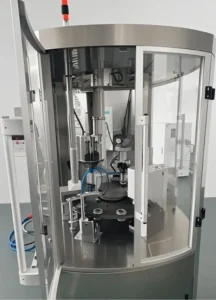
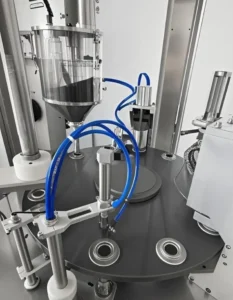
In-Line Coffee Capsule Filling machine:Capsules move along a straight conveyor, processing multiple capsules at once. Ideal for high-volume production.SK-4 Coffee Packing Machine
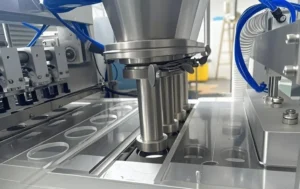
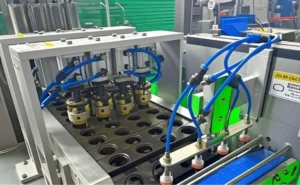
2. Servo Motor & Auger Filling System
A servo-driven auger filler ensures precise coffee dosing, maintaining consistency across batches. For example, the net weight of a Nespresso capsule usually ranges between 5-7g. Inaccurate filling weight can affect coffee quality and brewing results, making precision an essential feature.
3. Advanced Sensor Technology
| Cup & Powder Detection Sensors | Detect whether capsules are placed correctly in cavities and whether the correct amount of coffee is dispensed. This helps prevent coffee waste and ensures each workstation operates efficiently. |
| Mold Changeover System | Allows flexibility in handling different capsule size (Nespresso, K-Cup, Lavazza, etc.), enabling manufacturers to switch between formats with minimal downtime. |
| Nitrogen Flushing for Extended Shelf Life | A nitrogen flushing system ensures optimal nitrogen levels inside the capsules, removing oxygen and preserving coffee freshness for an extended shelf life |
| Weighting Device | Machines with integrated weighing systems ensure every capsule meets precise weight specifications, reducing inconsistencies in production and maintaining product quality. |
| Waste cleaning/powder sucking device | The waste cleaning function guarantees that there is no granule coffee left on the turntable (star wheel) or conveyor belt during packaging |
What First-Time Machine Buyers Should Consider
After understanding how coffee capsule filling and sealing machines work, beginners in coffee capsule production should ask themselves key questions before making a purchase:
| Capsule Size | Will you be producing Keurig coffee pods, Nespresso, Dolce Gusto, or other capsule types? Each type requires exclusive molds, specific filling weights, and sealing temperatures.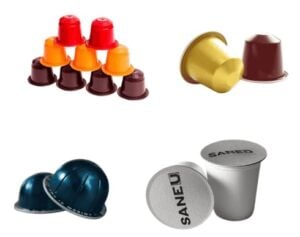 |
| Desired Production Capacity | Both rotary and in-line machines offer low, medium, and high production capacities. Choose based on your business scale. |
| Factory Space | Compared to rotary machines, most in-line machines require larger operational space due to their conveyor design. |
| Safety | Machines should be made with solid 304 stainless steel to prevent contamination. Also, poorly polished parts can cause injuries, so proper machine construction is essential. |
| Durability | From core electrical components to small screws, every part’s quality matters for long-term reliability. |
| Energy Efficiency | High-efficiency machines consume less power and reduce operational costs over time. |
| Ease of Maintenance | Machines with modular designs allow quick part replacements and minimize downtime. |
| Technical Support & Spare Parts Availability | Ensure that the manufacturer offers technical assistance, spare parts, and training to keep your machine running efficiently. |
| Future Scalability | If you plan to expand production, investing in a machine with upgradeable features can save costs in the long run. |
Technical Challenges in Coffee Capsules Packaging
- Nitrogen and Freshness: As we commonly know , the freshness of pack coffee directly relates to the level of nitrogen content inside. Injecting nitrogen into coffee capsules is more challenging than into pouches due to their limited space, precise sealing requirements, and higher pressure control needs. Coffee capsules have a small filling area, requiring nitrogen to be injected at controlled pressure and sealed immediately to prevent gas escape. In contrast, pouches have more volume, allowing nitrogen to disperse more easily before sealing. Additionally, capsule nitrogen injection systems demand high-precision nozzles and synchronized sealing to ensure oxygen is effectively displaced, whereas pouches can use continuous nitrogen flushing with less risk of rapid loss. This makes nitrogen injection into capsules more complex and equipment-intensive, yet crucial for preserving coffee freshness.
- Weight Variations: Coffee Capsules’ net wight (5-15g) requires packaging machines adopt premium auger filling system. Besides, mainstream coffee capsule brewing machines are designed according to coffee containment. The variations affects the brewing process, as underfilled capsules result in weak or inconsistent flavors, while overfilled ones may cause clogging or improper extraction in coffee machines. Additionally, weight inconsistencies can impact quality control, customer satisfaction, regulatory compliance, returns and ultimately profit margin.
Latest Coffee Capsules Market
- Sustainable Concerns and Compostable Cups: With the consumption of coffee capsules increases, recycling the waste has become the most serious among consumers. For example, 60% of coffee capsules on the market are made of plastic. The sales of plastic containers are estimated to increase USD 38.0 billion in 2033. As we know, plastic might take up to 1,000 years to degrade. To solve this problem, biodegradable materials are ideal alternative for coffee capsule producers. In 2023, Nespresso prounced that they invent Paper-Based Compostable Capsules. These capsules would replace its current recyclable aluminum capsules and deliver a high-quality coffee experience. In 2024, McCafe launched new Nespresso coffee capsules and cooperated with TerraCycle, a commercial waste management company, to promote recycling.
- Subscription business models are becoming the most powerful distribution channels for coffee capsules. Companies are offering personalized coffee selections delivered regularly, ensuring customer retention and increasing recurring revenue. This model benefits both consumers and brands by offering convenience and steady sales.
- Flavor innovations are driving consumer interest in coffee capsules. Brands are experimenting with new flavors, specialty blends, and limited-edition capsules to attract coffee enthusiasts. From dessert-inspired flavors to exotic single-origin beans, these innovations help companies differentiate themselves in a competitive market.
Conclusion
Investing in the right coffee capsule filling and sealing machine is crucial for coffee manufacturers looking to scale their operations. Understanding machine capabilities, market trends, and packaging challenges ensures long-term success. As sustainability, subscription models, and flavor innovations shape the future of the coffee capsule industry, businesses that adapt to these trends will have a competitive edge in the market.
At SANEU, we specialize in manufacturing exclusive coffee capsule packaging machines designed for precision, efficiency, and durability. Our machines cater to small roasteries and large-scale coffee manufacturers, ensuring top-tier quality and production scalability. Whether you’re new to the industry or expanding your operations, our advanced technology and expert support can help you achieve success in the booming coffee capsule market.
For more information on our innovative packaging solutions, visit our website or get in touch with us!




